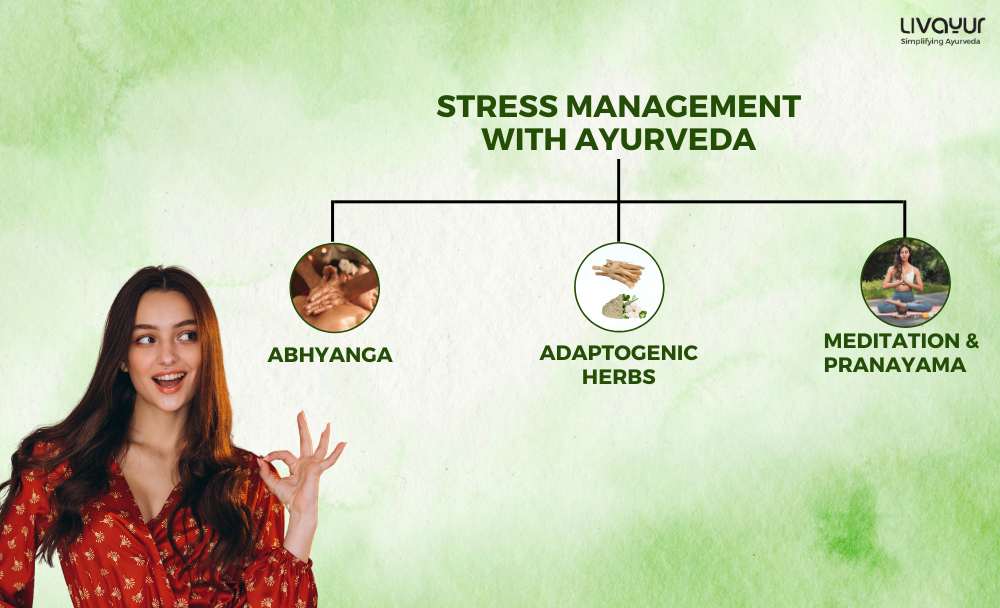This article has been reviewed by experts

Sexual wellness is not just about physical intimacy; it encompasses mental and emotional well-being as well. Ayurveda, an ancient Indian system of medicine, recognizes this interconnectedness and emphasizes the importance of mental health and well-being for a fulfilling sexual life. A troubled mind can hinder sexual desire and pleasure, while a calm and centred mind fosters a receptive sexual experience. Ayurveda also recognizes that emotions play a crucial role in sexual intimacy. Feelings of love, trust, and security create a foundation for deep connection and pleasure, while unresolved conflicts and insecurity can erode intimacy. By addressing the mind-body-spirit connection, Ayurveda offers a holistic approach to sexual wellness, empowering individuals to cultivate a satisfying sexual life.
Achieving Mental and Emotional Well-being through Ayurveda’s Comprehensive Framework [4]
- Ayurveda views sexual wellness as a holistic concept encompassing mental and emotional well-being.
- Doshas, the three fundamental energy forces in Ayurveda, influence not only physical health but also mental and emotional states.
- Imbalances in doshas can manifest as mental stress, anxiety, or emotional turbulence, potentially hindering sexual fulfilment.
- Ayurveda offers personalized approaches to address doshic imbalances, promoting overall well-being, including sexual wellness.
- These approaches include dietary modifications, lifestyle adjustments, and specific Ayurvedic remedies tailored to an individual’s dosha type.
Stress Management in Ayurveda
Stress is a significant factor that affects both mental well-being and sexual health, as per Ayurveda. Stress is characterized as a disturbance primarily in the Vata dosha in the ancient texts, leading to restlessness and mental fatigue. Ayurveda provides several interventions for effective stress management, including:
- Abhyanga (Ayurvedic Massage): Regular oil massage, known as Abhyanga, is recommended to pacify Vata and induce a profound sense of calmness, promoting mental relaxation. [1]
- Meditation and Pranayama: Mind-calming practices like meditation and controlled breathing (Pranayama) are integral components of Ayurvedic stress management, aiding in stress reduction and mental well-being. [3]
- Adaptogenic Herbs: Ayurveda suggests the use of adaptogenic herbs such as Ashwagandha and Brahmi to counteract the effects of stress on the nervous system, promoting resilience and mental stability. [2]
Nurturing Emotional Well-being Through Ayurvedic Practices
Ayurveda is an ancient medical system that emphasizes the importance of holistic health and wellness. It recognizes the complex relationship between our emotions and sexual health, highlighting the role of emotions in maintaining mental well-being.
According to Ayurvedic principles, our emotions (known as Bhavas) are closely linked to our doshas, which are the three fundamental energies that govern our physical and mental processes. To maintain optimal health and well-being, Ayurveda recommends cultivating positive emotions and managing negative ones. By doing so, we can balance our doshas and support healthy sexual function, as well as promote overall physical and mental health. [6]
Addressing Emotional Imbalances Holistically [4, 5, 6]
1. Sattvic Diet for Emotional Balance:
Ayurveda promotes a Sattvic diet that emphasizes fresh, wholesome foods to promote emotional balance and overall well-being. It is believed that a Sattvic diet is helpful in maintaining physical and emotional balance.
2. Avoidance of Excessive Consumption of Spicy or Processed Foods:
It is recommended to avoid excessive consumption of spicy or processed foods as they are considered to be detrimental to emotional stability. Such foods are believed to disturb the natural balance of the body and mind.
3. Yoga and Mindfulness Practices for Emotional Equilibrium:
The regular practice of yoga, coupled with mindfulness techniques, becomes a cornerstone for individuals seeking to connect with their emotions and maintain emotional equilibrium. Yoga and mindfulness practices are believed to help in managing stress and anxiety, which are common causes of emotional imbalances.
4. Ayurvedic Herbs for Emotional Well-being:
Ayurvedic herbs like Jatamansi and Shatavari are recommended to support emotional well-being and balance the doshas. These herbs play a crucial role in fostering emotional stability by calming the mind and reducing stress and anxiety. They are believed to help keep the mind and body relaxed, which is essential for emotional balance. Incorporating Ayurvedic herbs into one’s daily routine can help in promoting emotional well-being and balance the doshas.
In conclusion, Ayurveda’s approach to sexual wellness goes beyond just physical aspects and takes into account the intricate connection between mental, emotional, and sexual well-being. By addressing stress, cultivating positive emotions, and embracing holistic practices such as yoga, meditation, and Ayurvedic herbs, Ayurveda offers a comprehensive framework for promoting not just a healthy sexual life but a holistic and fulfilling one. Ayurveda aims to create balance in all aspects of life, which is why it has gained widespread recognition as a holistic and natural approach to sexual wellness.
FAQs
1: How does Ayurveda establish a link between mental well-being and sexual health?
Ayurveda views mental well-being as integral to sexual health. Imbalances in doshas, particularly Vata, due to stress or mental fatigue, can significantly impact sexual wellness.
2: Can Ayurveda provide solutions for sexual issues related to stress?
Ayurveda provides a range of interventions such as Abhyanga, meditation, and adaptogenic herbs to effectively manage stress and positively impact sexual health.
3: Are emotions given consideration in Ayurveda concerning sexual wellness?
Ayurveda emphasizes the impact of emotions on overall health, including sexual wellness. Positive emotions are considered essential for maintaining balance and promoting optimal health.
4: How does diet play a role in emotional balance, according to Ayurveda?
Ayurveda recommends a Sattvic diet, comprising fresh and wholesome foods, to promote emotional balance. It suggests avoiding excessive consumption of spicy or processed foods.
5: Which Ayurvedic herbs support emotional well-being?
Herbs like Jatamansi and Shatavari are recommended in Ayurveda to support emotional well-being and balance the doshas. These herbs contribute to emotional stability.
References:
- https://www.researchgate.net/publication/344745102_AYURVEDA_ABHYANGA_MASSAGE_PROCEDURE_-_A_REVIEW
- https://www.ncbi.nlm.nih.gov/pmc/articles/PMC3573577/
- https://www.ncbi.nlm.nih.gov/pmc/articles/PMC7336946/
- https://www.ncbi.nlm.nih.gov/pmc/articles/PMC3705701/
- https://www.researchgate.net/publication/342803299_CONCEPT_OF_MENTAL_HEALTH_IN_AYURVEDA
- https://www.ncbi.nlm.nih.gov/pmc/articles/PMC4151601/


















